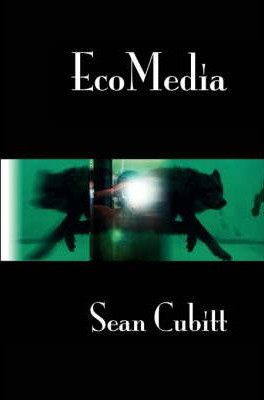Sean Cubitt: EcoMedia (2005)
Filed under book | Tags: · bioethics, biopolitics, cinema, ecology, film, popular culture, technology, television

“For the last twenty years ecology, the last great political movement of the 20th century, has fired the imaginations not only of political activists but of popular movements throughout the industrialised world. EcoMedia is an enquiry into the popular mediations of environmental concerns in popular film and television since the 1980s. Arranged in a series of case studies on bio-security, relationships with animals, bioethics and biological sciences, over-fishing, eco-terrorism, genetic modification and global warming, EcoMedia offers close readings of Peter Jackson’s The Lord of the Rings, Miyazake’s Princess Mononoke, The Perfect Storm, X-Men and X2, The Day After Tomorrow and the BBC’s drama Edge of Darkness and documentary The Blue Planet. Drawing on the thinking of Flusser, Luhmann, Latour, Agamben and Bookchin, EcoMedia discusses issues from whether animals can draw and why we like to draw animals, to how narrative films can imagine global processes, and whether wonder is still an ethical pleasure. Building on the thesis that popular film and television can tell us a great deal about the state of contemporary beliefs and anxieties, the book builds towards an argument that the polis, the human world, cannot survive without a three way partnership with physis and techne, the green world and the technological.”
Publisher Rodopi, Amsterdam, 2005
ISBN 9042018852, 9789042018853
x+168 pages
PDF (updated on 2021-3-3)
Comment (0)Frances Guerin: A Culture of Light: Cinema and Technology in 1920s Germany (2005)
Filed under book | Tags: · 1920s, cinema, film, film history, germany, silent cinema, technology, weimar republic

Cinema is a medium of light. And during Weimar Germany’s advance to technological modernity, light – particularly the representational possibilities of electrical light – became the link between the cinema screen and the rapid changes that were transforming German life.
In Frances Guerin’s compelling history of German silent cinema of the 1920s, the innovative use of light is the pivot around which a new conception of a national cinema, and a national culture emerges. Guerin depicts a nocturnal Germany suffused with light – electric billboards, storefronts, police searchlights – and shows how this element of the mise-en-scene came to reflect both the opportunities and the anxieties surrounding modernity and democracy. Guerin’s interpretations center on use of light in films such as Schatten (1923), Variete (1925), Metropolis (1926), and Der Golem (1920). In these films we see how light is the substance of image composition, the structuring device of the narrative, and the central thematic concern.
This history relieves German films of the responsibility to explain the political and ideological instability of the period, an instability said to be the uncertain foundation of Nazism. In unlocking this dubious link, A Culture of Light redefines the field of German film scholarship.
Publisher University of Minnesota Press, 2005
ISBN 0816642869, 9780816642861
314 pages
PDF (updated on 2014-9-5)
Comment (1)Paul Virilio: The Vision Machine (1988-) [EN, ES, SK, RU]
Filed under book | Tags: · art history, cinema, photogrqphy, technology, telepresence, urbanism, war

Surveying art history as well as the technologies of war and urban planning, one of France’s leading intellectuals provides an introduction to a new “logistics of the image.”
Originally published in French as Le machine de vision, Editions Galilee, 1988
Translated by Julie Rose
Publisher Indiana University Press, 1994
ISBN 0253209013, 9780253209016
81 pages
Key words and phrases
Gericault, telepresence, phatic, Paul Strand, Edward Steichen, Descartes, Gustave Lebon, Abel Gance, Daniel Buren, Adolf Loos, speed of light, Robert Flaherty, Edgar Allan Poe, Madame Bovary, Auguste Rodin, camera obscura, Albert Speer, British Documentary Movement, wings of desire
PDF (English, trans. Julie Rose, 1994)
PDF (La Máquina de Visión, Spanish, 2nd ed., trans. Mariano Antolin Rato, 1998)
PDF (Stroj videnia, Slovak, trans. Mária Ferenčuhová, 2002)
PDF (Машина зрения [Mashina zreniya], Russian, trans. A. В. Шестакова, 2004)

